|
Disclaimer: The views expressed in this blog are those of our guest blogger, author Chris Graham, and not necessarily those of Selfishgenie Publishing. Making a Name for Yourself… from a novelist’s point of view  Names, where do we get them from? They usually come from our families, both the surnames we get automatically, and the forenames that can be reliant on a number of factors. Sometimes a kid gets lucky, and is given a nice normal everyday name, often from the annals of his or her family’s history. “Oh look… she’s got old uncle Samuel’s eyes. Let’s call her Samantha.” Of course this can backfire. We can all think of a celebrity cook whose father was a famous politician. Doubling the ‘l’ and bunging an ‘a’ on the end of her dad’s name could have gone so badly wrong, but our favourite middle aged man’s fantasy kitchen goddess seems to have done OK out of it (Yes, I do know that ‘Nigella’ is also the name of a herb - case of nominative determination perhaps?).  The Emperor Justinian - who gave his name to all the little Justins in the world. The Emperor Justinian - who gave his name to all the little Justins in the world. Sometimes it’s the time of the kid’s birth that lumbers them with a name. How many little girls born in the eighties answer to ‘Kylie’, or from more recent years, ‘Beyonce’? I’m sure there are young Bieber fans pushing buggies carrying little ‘Justins’ around the supermarket aisles too, although Justin has been a forename for many centuries. There was a Roman Emperor called Justinian back in 527 AD. Of course, there’s those who simply want to be different, whether famous or not, just for the sake of being being different. Those who, without a thought about when their offspring goes to school and gets the mickey taken out of them, give their little ones names more suited to a pet, a dessert recipe, or an address in downtown New York.  ‘Fifi Trixibelle’ or ‘Strawberry Shortcake’ are not what a strapping thirteen year old lad wants to be known as. Even for a girl they’re a bit on the bizarre side. ‘Brooklyn’ doesn’t sound too bad, though like ‘Lourdes’, and ’Chelsea’, it sounds more at home on a girl. I worry that this is setting a trend. Are we going to see classrooms filled with young ‘Shepherds Bushes’ or ‘Neasdens’ in the future? Perhaps for a transatlantic equivalent they’d be ‘Yonkers’, “Bronxes’ or ‘Haight Ashburys’. But I’m not really talking about our own names, or our children’s names. I’m talking about the names we writers choose for our characters. Where do we get those from? Do they work? Can our readers identify with them? Can our readers even remember which one is which as they make their way through our novels? I was reminded of this when a former publisher asked me to look at a few pages of a submitted manuscript. There were a number of characters introduced within the first couple of pages, of which there were several with the same forename, and others who, because they were related, had the same surname.  Now I know that in the potluck world that we live our real lives in, this kind of thing isn’t uncommon. The crowd I hung around with (and still know most of) had a surfeit of ‘Ians’ at one point. Fortunately, as was the spirit of the time, they all acquired nicknames, and so became ‘Ahmed’, ‘Abdul’, ‘Fang’, ‘Screwy Lewie’, ‘Mr Magoo’ and ‘Ian Mac’. However, to help our readers, we need to have ‘real’ names for our characters that define them. During the narrative, and particularly as markers in dialogue, we may call a character by his forename - full or shortened - his surname, his nickname, his rank - as in ‘the Sergeant said’ - or some other descriptive title, such as ‘the older man’ or something similar. One of my police characters, Detective Chief Inspector Nick Wilson, is known as ‘Nick’, ‘Wilson’, ‘The Guvnor’, ‘Guv’, ‘the DCI’, ‘The Chief Inspector’, (or just plain ‘Inspector’) throughout periods of dialogue and narrative to avoid too much word repetition. Others have similar selections to identify them. So… How do we deal with this? How do we populate our novels with names which are individual?  Every writer needs to compile a list, and keep topping it up: a pool of names for their characters, but how do we come up with these characters’ names in the first place? Where do we find them? Do they grow on trees for us to just go out and pick? Well the answer to that is ‘almost’. In fact trees are as good a place as any to start, as are any other interests that you might have. Trees? Well there’s ‘Beech’ and ‘Birch’, ‘Sycamore’, ‘Redwood’, ‘Ash’, ‘Pine’, ‘Maple’, just for a start. All of them perfectly believable surnames, or they can be with suitable modification like ‘Ashwood’, ‘Oakley’, ‘Elmsleigh’, etc.  I’m into motorcycles, so I’ve gleaned names from that world like ‘James Villiers’ - most post war James motorcycles used Villiers engines - ‘Frances (Frankie) Barnett’ (though she prefers ‘B’ as a nickname) - my first bike was a Francis-Barnett, or ‘Fanny B’ as they were known. Another is ‘Lucas Bright’, and I’ve used ‘Plug Champion’, ‘Tillotson’, ’Douglas’, ‘Benelli’, ‘Blackburn’, ’Henderson’, and ‘Ancilotti’ with appropriate forenames. If these aren’t familiar words to you, Google them. It’ll be a fun game looking for the motorcycle connections. From an interest in pioneer aviation comes names like ‘Saulnier’, ‘Anson’, ‘Guynemer’, ‘Voisin’ and ‘Fonck’. Then there’s towns and counties, with ‘Georgia Didcot’, ‘Noel Caversham’, and ‘Adrian Kent’… more Googling games for you to play. A fellow author published by Selfishgenie litters his books with the names of well-known rugby players from both the present and the past. They say, ‘Write what you know’ ...  Turn your friends into characters Turn your friends into characters Most productive of all, though, is that rich vein of people we know, or have met, that we can mine for suitable character names, though when putting these in my pool, I have a certain convention that I try to follow. I’ll almost always mix the names up, rarely using both forename and surname from the same person as a character’s name. Usually I’ll only use full matches in the case of people who were either long deceased acquaintances, family, or friends, of my late parents’ generation, or are just names I’ve heard. There’s no point in upsetting your mates by using their names in print, then describing 'them’ as someone they may not like to be, though there is one old friend who actually asked me to use his name and physical description as a character in a novel. It was on his bucket list. As he’s a cat lover, and tireless worker for local animal charities he, of course, became a corrupt vet in one of my novels. Sometimes it’s particularly satisfying to name a nasty piece of work as an old boss or other bad memory from your past, but there’s one thing to beware of. When you do choose a name for a really nasty villain, it’s a good idea to Google that name to make sure that he or she isn’t someone really famous, even if you’ve never heard of them, and particularly if your character falls within a similar field. It might not look too good if your mad wheelchair bound evil genius was called Stephen Hawking, would it? Remember history  A lot of names fall out of favour over time (You won’t find many Germans called Adolf born after 1945), so you can add a flavour of authenticity to your historical work by including period names. Archibald isn’t a name you hear much these days (If at all), but right up until the 1960s there were plenty of them about. One was even a ventriloquist’s dummy on a radio show (No, I kid you not). Similarly, Ernest, Stanley, Norman, and others all had their day in the Sun then fell out of favour. A friend of mine said she could tell the age of a woman by her name, with gemstones (Beryl, Pearl, Amethyst and others) all denoting pre-war births, alongside Mavis, Agnes, Agatha, Cecilia and a whole lot more. Flowers were also popular as names until the late 60s but now are hardly used at all (Though I do know a Primrose who is under 30 and there's also the singer Lily Allen). After World War II, many boys were given the name Winston in honour of Britain’s wartime Prime Minister, but you won’t find many with that name these days. Helpfully, there are lists of names popular in different decades available on websites. The “Gender Construction Kit” website provides popular names for decades between the 1950s and the 2000s, for example. And, of course, the national census provides lots of historical names for you to conjure with and you can access that in the UK through the Office of National Statistics website. Get it right… Do the research, then save for a rainy day  Even fictional character names have to be believable, so for foreign characters, or those from different ethnic backgrounds, it’s worthwhile to Google ‘common names’ for a nationality or culture for names, or to mix and match the names of well known people from that nation’s culture or history. But be aware that some cultures alter names to suit a gender, even surnames. For example, in Icelandic culture, a surname ending in ‘son’ may denote its bearer to be the son of the first part of the name… e.g. Erikson as ‘son of Erik’… However the female offspring of ‘Erik’ in Iceland won’t take her father’s surname, but instead will have the surname ‘Eriksdóttir’ (Erik’s daughter). Thanks to a change in Icelandic law, parents can now use the mother's name instead and children can switch to their preferred parent's name when they grow up, if they wish. Yes, I found this confusing too. Likewise, even in English speaking cultures, some forenames that are considered female in one country will be more commonly male in another. In the UK, ‘Tracy’ is usually a girl’s name and ‘Robin’ a boy’s name, but in the US these are more likely to be the other way around. Keep your ears and eyes open. If something comes into your sights, whether in the local curry house, or on the TV news, remember to put it into the pool, even if you’ve no use in your current work in progress. These things will always be useful one day. Add all these names into your list. Don’t bother with putting them in any order as they’re as random as the opportunities to use them but keep adding to the list as new ones come to mind. Don’t forget that there are forenames that can be surnames, and vice-versa. In Scotland the likes of Fraser, Cameron, Donald and others can be either a forename or a surname.  Finally, if you are really stuck, there are lists of gender appropriate baby names published for almost every country in the world. Many of those lists also provide a “meaning” (real or imagined) for the name, so if you want to indicate that a character has the strength of a lion, you can find which name might be appropriate; Leona for a girl, perhaps, or Leonard for a boy, but there’s also Aerial, Braylen, Dillon and others. If you have enjoyed this blog, or found it informative, then make sure you don’t miss future editions. Just click on the button below to sign up for our newsletter. We’ll even send you a free ebook for doing so.
0 Comments
Disclaimer: The views expressed by our guest blogger are not necessarily those of Selfishgenie Publishing. Given some of the subject matter, we have decided not to follow our usual practice of illustrating this blog, except for images that can already be found on this website.  I had better set a few expectations before I really get into this blog. First of all, I won’t be trying to justify myself in any way. Secondly, I realise that my life choices aren’t necessarily mainstream and I’m not, for one moment, suggesting that anyone else should follow my path. Finally, I’m really only going to talk about my books and how they came to be written. If you have already read my first book, “Naughty Girl”, then you will know my story. If you haven’t, then the potted version of it is: normal childhood, met a bloke, got let down by him, had to make a living in the ‘oldest profession’ (to use a euphemism) and then covid curtailed my ability to make money and so I wrote my book in order to try to make a few extra pounds. Nothing remarkable there, apart from the way I made my living, but I’m very far from being the only person, male or female, to take that route. You would be surprised at how many ‘respectable’ people have done it. One of them may even be your next door neighbour and you wouldn’t know it unless (a) they told you, (b) your paths had crossed in a professional capacity or (c) there had been a scandal and their name was revealed. "If they didn’t exist, I would have died of starvation back in the 1970s." B is a particularly interesting reason for knowing. There is a lot of hypocrisy around and many of the people who engage me for my professional services may be your partner or neighbour, a relative or a friend and again you wouldn’t know it, for very much the same reasons. If they didn’t exist, I would have died of starvation back in the 1970s. One in ten men say they have paid for sex. Those are the ones who admit it, therefore the real figure is probably far higher. For all you know, one of them may be the one you married or are in a relationship with. And we’re not just talking about sex with women, of course. And it isn’t just men; 1 in a 100 women have paid for sex too. OK, it is far fewer, but it is still a lot of women. Statistically speaking, there is probably someone reading this blog right now thinking “I had better not let my spouse/partner/boyfriend/girlfriend read this”. So, I had better start answering some of the questions that get emailed to me (via my publisher) about my books, because that is what I’m supposed to be doing in this blog. Not questions about my profession, I hasten to add. The answers to those FAQs are in “Naughty Girl.” "The next most frequent question is whether the stories I tell in Naughty Girl are true." The most frequent question I get asked is if I’m a real person. The answer is yes, but I would say that even if I wasn’t because if I wasn’t, the person who created me would say that. So, believe me or don’t believe me, it makes no difference to me. But I am really real. Arabella Aristo is a pen name, of course. The next most frequent question is whether the stories I tell in Naughty Girl are true. Yes, they are. In fact, those are the stories I considered to be believable. There are far more I could have written but decided they just wouldn’t be believed. It is one of the cases where the truth is stranger than fiction. Question three in terms of popularity is whether I would ever consider naming names for cash. That one usually comes from people who want to make money from my revelations, whether by writing for the press or from blackmail. The answer is a resounding NO. The one thing my clients have to know is that they can trust me to be discreet. I require the same from them, of course. I have no desire to have my photo splashed across the Sunday papers, upsetting my grandchildren. Believe me when I say that the amounts of money offered are large enough to be tempting, but I have never given in to that temptation. Nor would I. I will take my secrets to my (environmentally friendly) grave. "After four decades of my lifestyle, I felt that my story should be heard." Question 4 is about what motivated me to write my story in the first place. If you have read Naughty Girl then you will know that I’m not exactly poor. But I do have bills to pay, and savings don’t last forever. So, the income from my books keeps the wolf from the door without having to rob my piggy bank. But it was more than that. After four decades of my lifestyle, I felt that my story should be heard. Some may take it as a warning to be careful about who they fall in love with. Others may take it as an object lesson regarding how important a good education is. Other people may read something else into it. That is the wonder of books – they mean different things to different people. "Many women in my profession are well educated." All are true, of course. But my chosen partner was a good man when I met him. Circumstances changed that. Nobody can know how things will change when the circumstances change and most of my regrets are only the result of hindsight, because we don’t have crystal balls to give us foresight. As for the education thing, I can tell you that many women in my profession are well educated. I know of some who paid for their education (and are free of student debt) because of the profession. Some of them discovered that the profession paid far better than the one they studied for. And some suffered shortfalls in cash flow (as I did) that forced them to choose between eating or having sex with strangers. "There is a big difference between hypothetical hunger and the reality of not knowing where your next meal is coming from" And before any reader says “I would rather starve”, just wait until that is a realistic prospect before you leap to judgement because there is a big difference between hypothetical hunger and the reality of not knowing where your next meal is coming from. But of course, those circumstances only cover my first book. What about books 2 and 3?  Book 2, “Stalker” was inspired because I have known ladies in my profession who have been in great danger in their lives. Let’s face facts, it is no secret that there are predatory men out there and we working girls make an easy target. Peter Sutcliffe is proof of that, but we can go back to Jack the Ripper if you want to. I’m sure there have been others, but I can’t be bothered to do the research right now. So, taking a few stories from friends and putting them together in a crime thriller seemed like a natural progression once the writing juices had started to flow. They say “write what you know” and I certainly know the sex trade. That accounts for Book 3 as well. “Three In A Bed” is a collection of three short stories that, again, were inspired by stories from friends. Although not all the characters are “naughty girls”, their stories are based on real life events even if I have exaggerated the consequences.  Finally, I am always asked if I have any regrets about my choice of career. Regrets would be the wrong word, I think. I would rather my husband’s business hadn’t gone bust and risked us losing our home. But those were circumstances beyond my control. It wasn’t a decision I had within my power to make, so I can’t regret it. OK, do I regret marrying him? No, not one bit, because before that he was the nicest, sweetest man. I loved him and I believe that he loved me. Circumstances changed him and they changed me too. Would I have rather had a “normal” job? Of course I would. But back then it was much harder to get one that paid a woman enough money to pay a mortgage. Even today I think many women with my educational background wouldn’t be able to make ends meet. In fact, I know a lot of women who are struggling in that way and are at their wits end. So, I have no regrets about making the decisions I did. “Needs must when the Devil drives.” As the old saying goes. Thank you for reading this and for not judging me (though you probably did). To find out more about Arabella Aristo’s books, see our “Books” page. If you have enjoyed this blog, or found it informative, then make sure you don’t miss future editions. Just click on the button below to sign up for our newsletter. We’ll even send you a free ebook for doing so.  Once again we turn to Facebook for the inspiration for our blog and one of the perennially reoccurring questions on which writers ask advice. “Is it Ok for me to quote song lyrics/use images in my book?” Yes, this is about the laws of copyright, and they are an essential for self-published authors to understand if they want to stay out of the law courts. Unfortunately, instead of Googling the answer, these writers ask other writers, not all of whom have a good grasp of the law as it relates to copyright. First of all, I must give a legal warning of my own, which is that the copyright laws vary from country to country. The major differences are in the duration of copyright after the death of the copyright owner, so it is well worth Googling the law as it relates to your own country. What I discuss here relates to the law as it is applied in the UK and EU. What is consistent between countries is that there is a general agreement that each country will uphold the copyright law as it is applied in the country where the work was first copyrighted. So, if you are in the UK and you publish something that is copyright protected in the USA, then British courts will uphold the USA copyright law if the USA copyright owner asks them to. Copyright law exists to protect the creators of original work (which, of course, includes you and me). The work can come in many forms, written, musical, graphic or photographic, digital or physical and the laws are constantly being updated to keep up with modern technology. But first, let’s deal with a misunderstanding.  Fair Use In copyright law there is a term called “fair use” which allows extracts from copyright material to be used without permission under certain circumstances. Unfortunately, some people interpret “fair use” to mean they can just copy stuff and get away with it. As you may guess by the fact that I have mentioned it, this is not the case. “Fair use” means that under certain tightly defined circumstances, someone can quote or use copyright materials without permission. Those circumstances are: 1. In the context of a review. 2. As part of teaching materials. 3. In academic papers. So, if you aren’t writing a review, you aren’t teaching people and you aren’t writing an academic paper, you can’t use “fair use” as an excuse for using copyright work. For example, in this blog space we also publish reviews of books and always include the book’s cover image. That would be classed as “fair use” because it is being used to illustrate a review of the book. Even if you are doing one of the 3 things detailed above, the amount of copyright material you can use is limited to that which is absolutely essential to make the point. So, you might be able to quote a single line of a song, but not a whole verse. In the event of a prosecution, the defendant (you) would have to prove that the amount of material used was the bare minimum essential to get across your point. So, that’s “fair use” in a nutshell.  If you want to use copyright material under any other circumstances you have to have the copyright owner’s permission and that usually amounts to paying for a licence to use it. Licences aren't cheap, which is why people are always trying to find ways of avoiding their purchase. We just bought one from a museum's image archive to use on a cover and it cost us £162 ($202). And there is a limit in the licence to the number of copies of the book we can sell before we have to pay more. And the maximum number is different for the ebook, the paperback and the hardback versions. If you think that is expensive, if it nothing like the total you would have to pay in damages and legal fees if you were sued for breach of copyright. But hey - it's your money. Copyright doesn’t last forever, so when it expires it is permissible to quote from works, use images etc that were previously subject to copyright. That means that when the originator of the work has died, it may be permissible to use their work. BUT They have got to have been dead for a certain amount of time.  "Age does not weary them." Just because a song was written or a photograph was taken a long time ago, it doesn’t mean it is out of copyright now. Let’s say someone writes a song when they are 20 and they die when they are 90. That’s 70 years. There is then a period when their estate owns the copyright for their work. In the UK and EU that is 70 years, but it may be longer or shorter in other countries. So, in that example there is a total copyright period of 140 years. That means that if the song was written 139 years ago is still in copyright. To put a year on that, it is 1885. But a song written in 1884 is either out of copyright now or it will be later this year, Yes, that’s right. A song written in 1885 may still be in copyright if the writer lived long enough. And the same applies to images, which is why companies such as Getty Images are still able to charge you to use every old photographs, such as those taken during World War I. And just for good measure, in co-authored work it is the date of the last co-author or co-creator to die that counts. John Lennon has been dead for over 40 years, but the songs he co-wrote with Paul McCartney won’t be out of copyright until 70 years after Paul McCartney’s death and he is still very much alive (at time of writing).  But what about using images? The same basic rules apply. Does that mean you could include an image of the Mona Lisa in your book? No. Yes, we know Leonardo Da Vinci has been dead since 1519, which is a lot more than 70 years, but that isn’t the point in this case. You wouldn’t be using the actual Mona Lisa, because that is a physical object, and you can’t put a physical object in either an ebook or a paperback. You would be using an image of the painting, and that image will be subject to copyright. The copyright owner would either be the Louvre museum or the photographer who took the image, depending on the arrangement between the museum and the photographer. The only certain way to get a copyright free image of the Mona Lisa is to go to Paris and take your own photo (you can’t use a flash or “selfie sticks” – I checked). Basically, if you didn't take the image, you probably have to pay someone if you want to use it. Which is where we come to “Free to use” images. If you do a Google search using that term you will come across a lot of sites that offer free images, but they have a hidden trap.  In most cases that “free to use” phrase means free to use for personal use, not for commercial use. To use the image commercially you have to buy a licence (the same often applies to “free to use” music). So, it is essential to check the licensing terms, which will be available somewhere on the site, before you download the image and use it. “Personal use” usually means you can use it to hang on your wall at home, for a personal post on social media or, perhaps, to illustrate a blog. It does NOT mean you can use it: 1. within a book, 2. as part of the cover of a book, 3. as part of an ad campaign, 4. as part of a book promotion on social media, 5. on a banner or a flyer at a book fair.  Items 3 – 5 in that list may be puzzling you, so I had better explain. If you are trying to sell something you are engaging in a commercial activity, so the use of the image is “commercial”, not personal, and usually requires a licence. This has caught out a lot of authors because they didn’t realise that. That list is not exhaustive, by the way. There may be other activities that are classed as commercial. There is a site called “Creative Commons” where you can search for “free to use” media but do check their terms and conditions to understand how you may use it.  Who owns copyright after death? That varies from case to case. Copyright is part of a person’s estate, so the original copyright owner usually assigns it in their Will and if they die without leaving a Will it will pass to their next of kin, just like any other asset. If the beneficiary of the Will (or the NoK) then dies, the same thing happens. As can be imagined, it isn’t always easy to track down the legacy copyright owner after someone has died. This is why authors often set up trust funds while they are alive, so that the fund manages their copyright after death. Others sell the copyright for their work to specialist companies, so they benefit from the work while they are still alive and able to enjoy the wealth. Photographers often sell the right to make money from their work to companies such as Getty Images (but the photographer still owns the copyright). An iconic photograph that appears on the front pages of newspapers around the world may be worth a lot of money to the photographer as those sorts of images are often reproduced to illustrate media articles. FYI – Getty Images and similar companies always charge a lot of money if you use one of their images without a licence (a lot more than the cost of an actual licence), because the alternative is a lawsuit, which you would lose, and which would be even more expensive. So, if you don’t want to pay for a licence, don’t take the risk of using the image!  Public Domain Once the copyright on a piece of work has expired, it becomes “public domain”. That means anyone can publish it and make money from it. For example, if you want to take the complete works of Shakespeare and publish them, you can. However, you can’t claim them as your own work. That is plagiarism. They are still Shakespear’s work, and his name would still have to appear on the cover. Even though Shakespeare has been dead for over 400 years, so he can’t sue you for plagiarism, you would lose all credibility as an author if you were to claim his work as your own. You would certainly never get a publishing contract with any reputable publisher. If you quote or use public domain work, it is normal to credit it to its original creator, even in works of fiction.  What about AI? When it comes to AI generated work, whether text or images, it may be subject to copyright (or it may not). It is such new technology (in relative terms) it hasn’t yet been tested in court, but there are lawsuits in progress. Only humans can own a copyright. So, images created by AI can’t be made copyright by the owner of an AI software company. However, the images used to train the AI may be subject to copyright and that is where the real trap lies. Getty Images did open a lawsuit which alleged breach of copyright for using images that were subject to licencing agreements, to train an AI generator. By inference, they claimed that their licences were being circumvented by the use of AI to make subtle alterations. At the very least the Terms and Conditions of the AI generating platform need to be adhered to in order to avoid legal complications, because agreeing to those Ts & Cs constitutes a legally binding contract. In many cases the Ts & Cs limit the use of AI generated material to “personal”, which we have already covered under “free to use” images. It must be assumed that the use of AI writing software to produce books may also fall foul of the platform’s Ts & Cs if the user then publishes the finished work. However, there are also law suits in progress where authors are suing a well known AI platform for using their work, without permission, to train their AI platform, which is similar to the Getty Images case. The ramifications of such a legal case will have an effect on the users of AI to produce books because they may be infringing the copyright of other authors. We shall have to wait and see. Quite literally, the jury is still out on this. Just as an FYI, a book produced using AI is not copyrightable, because the author isn't human. So have some fun at the expense of cheating "authors" who use AI to produce books and re-publish them, just like the complete works of Shakespeare.  So, what we would like you to take away from this blog is: 1. “Fair use” may not mean what you think it means. 2. Don’t use copyright material without the copyright owner’s permission. 3. Just because someone is dead, it doesn’t mean you can use their work without permission. 4. If using “free to use” images, check the Ts & Cs because you probably need a licence to use the images commercially. If you have enjoyed this blog, or found it informative, then make sure you don’t miss future editions. Just click on the button below to sign up for our newsletter. We’ll even send you a free ebook for doing so. For this week's blog we are pleased to turn our page over to one of our authors, Chris Graham, for his take on what makes a good novel. Disclaimer: The views expressed in this blog post are those of the blog's author and are not necessarily those of Selfishgenie Publishing.  Your kind of book… What is it that makes a novel your kind of book? Is it the ‘main man’ (or woman), whether it’s a villain or one of the good guys, or is it the settings and the whole ambience of the book? Do you like the mystery aspect of the plot? Are the ‘whys’ and the ‘whos’ more important than the ‘hows’, or do you want every drop of spilled blood to splash off the page or dribble from your Kindle into your lap? (Editor's comment: Gross Chris, tone it down a bit!) Do you like to hear every crunch of bone as our bad guy brings down his cudgel, or as the hero breaks the villain’s jaw with a well-placed uppercut?  On the other hand… Maybe you’re not into ‘derring do’ or the crime fighting. Maybe it’s the interaction between the characters that floats your boat: something that I assume is the attraction of romance fiction, or even erotica, but which can be just as prevalent in crime writing. Do you like every nuance of the characters’ feelings to be clarified? Or perhaps you prefer to work it out for yourself, or even be surprised when two characters end up in bed, or even walking up the aisle? When they do get it together, should every glistening bead of sweat or running teardrop of happiness or remorse be turning the page to a soggy mess? Should every pant of passion be spelled out in breath by breath detail till the lovers can hold it no longer? On the other hand, their feelings may take a different turn, and they begin to disagree about everything, or even start taking swings or kicking the crap out of each other.  Variety is the spice of life… or death. As well as writing, I read too, both for my own pleasure and when proofreading other authors’ work, and it’s fascinating to see how different writers go about their craft. This is for my own interest as a reader as well as from a comparative perspective, to aid my own writing. Yes, I suppose it could lead to plagiarism, but we writers prefer to call it ‘influence’. Everyone from Shakespeare and before, through to Barbara Cartland and her legions of imitators, has done it. Whether they knew it or not. It’s interesting, being a crime writer myself, to note the different types of protagonists in crime fiction. There are the lucky sleuths, often living in tiny communities, who regularly get a nice juicy crime dropped right into their laps. These can be local police officers, like Tom (and John) Barnaby of Midsomer fame, or they can be amateurs like Agatha Christie’s aged spinster, Miss Jane Marple, and Chesterton’s meddlesome priest, Father Brown, but the one thing they share, is an unfeasibly high serious crime rate for such small communities. Then there are the professionals who aren’t limited to their own small localities, like Poirot or Sherlock Holmes, and those ‘big city’ coppers like Lynda la Plante’s Jane Tennison, John Creasey’s Gideon, Biba Pearce’s DCI Rob Miller, or even civilised Oxford’s Morse, from the pen of Colin Dexter, all of whom at least have a reasonable catchment area for their crimes to occur in. With the professionals, we must also include those specialists who assist the police, like the CSI teams, the forensic scientists, as in TV’s ‘Silent Witness’, the psychologists like Thea Hartley’s Resa James, or Fitz from TV’s ‘Cracker’.  Anti-heroes Somewhere between these ‘good guys’ and our criminals, come those in a grey area. Working on the side of the ‘good guys’, but often from the wrong side of the fence, and bending, or even completely smashing, the rules. Characters ranging from Leslie Charteris’s urbane Simon Templar, or my own call girl, Lena Fox, to far more violent heroes like James Mitchell’s Callan, Lee Child’s Jack Reacher, and Frank Westworth’s JJ Stoner (a particular favourite of mine). It seems that the men and women in the white hats can be even more varied than the criminals they hunt down, but they usually fall broadly into two types: the ones who the reader identifies with and actually likes, and the absolute evil bastard who’s too far gone for legislative punishment to be enough for. The ones who deserve whatever sticky and often painful end that the author can dream up.  Lena Lena Back again… and again… So, what’s been the common denominator between all these characters I’ve outlined? Yes, they’re all series characters. All of them appear in multiple stories (or are destined to.) More interestingly, they all have quite complex ‘back stories’ running throughout the books or TV dramas. From Fitz’s gambling and tenuous family relationships, or Barnaby’s cosy village idyll, to Resa James and her tangled family and romantic life, and my own Lena and her friends (who very often are more important to the investigation that Lena herself). It’s a little like having your own private soap opera running alongside the crime novel. A soap that continues on from the last story in the series that you read, with a cast of familiar characters that the readers can know and love… or even dislike… maybe even starting out likeable, then becoming that ‘evil bastard’ that we all know and love.  Fun Friends Fun Friends Incestuous relationships… People do say that we writers have a relationship with our characters… especially those of us who write the aforementioned ‘series’ books with regular characters who appear from book to book. The characters you write become like your mates… even the dodgy ones. We’ve all got dodgy mates, haven’t we? But with my ‘Lena’ novels, in some cases all I can say is “The chance would be a fine thing” ’cos there’s a couple of characters in them who’d be an awful lot of fun to have a relationship with. However, we live with these characters all the time, because we’re creating their lives and their futures, so yes, I guess we are in a relationship with them, but wouldn’t that be some kind of incest? I mean to say… these ladies are my own offspring I suppose, so it makes it a bit suspect really.  Killing off your creation… I can remember one point in time when this relationship thing was hammered home to me. I’d decided that one good way to develop the plot of the novel I was working on would be for one of the characters to be murdered. (Not a regular character… This is the first book this one had appeared in.) I’d worked out why she should be murdered, and how it would affect the way I would end the novel (which was why she had to die) so I went ahead and wrote her death scene, even though the plot hadn’t quite reached that point yet. I could then steer the plot towards that point, and then onwards towards the final ending I had in mind. That's how I work. If I have to keep ‘turning the pages’ to find out what's going to happen, then hopefully, so will my reader. It’s only when I’ve got a fair way into the story that I decide how it might end… and even then it can often change.  Guilt… So, I’d done the grisly deed, initially anyway. However, I hadn’t been bargaining for this ‘relationship’ situation. After I’d written the scene, I began to feel really guilty, because she was such a nice character; one of the good guys, who’d already had some real crap chucked at her in the story… and I’d now become the nasty bastard who’d just murdered her in cold blood (well, in a lift, really… but you know what I mean.) It felt like bumping off a daughter. I wasn’t sure whether to use the scene or not. Should I just file it for later use? I can always change names and other minor details to slot it into another book later. Maybe use it to kill off a nasty scheming little slapper or something  I’ve done similar things with a couple of bedroom scenes that were cut from the original ‘Transactions’ manuscript because it was thought by a publisher that the mighty Amazon (no, not the river) might not be happy about too much description when the character has been clearly defined as ‘underaged’. (Her age was necessary to the plot). Apparently anything goes for grown ups, but teens need to be handled with care. As it turned out, leaving some things hinted at, or wondered about by the reader, made the scenes work even better. The original scenes were saved, then later had names, and in one case the character’s physical stature, changed to slot them into a later book (‘Deadweight’ - “Not too bad at all for a big girl”…due to appear under Selfishgenie’s banner soon). They worked perfectly. So, did I have a pang of conscience? What did I do with my charming, ‘good guy’ character? Did I decide that I couldn’t subject this delightful young lady to a nasty messy ‘choking on her own blood’, ‘bladder letting go’ death in a lift?  Chris Graham Chris Graham Did I hell. I used the piece, getting straight down to writing the scenes leading up to it, and following her death, her killer being hunted down by her boyfriend, fuelled by a dangerous and unstable high octane brew of agonising pain, intense hatred, and adrenalin. This writing lark can be so much fun sometimes. Over to you, blog readers… What kind of novels float your boat? What kinds of characters appeal to you? Which kinds of settings, locations, and situations? I’m sure that’s a question that all authors and budding authors out there would love to know the answer to. To find out more about Chris Graham and his books, click here. If you have enjoyed this blog, or found it informative, then make sure you don’t miss future editions. Just click on the button below to sign up for our newsletter. We’ll even send you a free ebook for doing so. We are turning this week's blog over to one of our authors, Robin Saint, posting on the subject of Robin Hood. Disclaimer: The views expressed in this blog are not necessarily those of Selfishgenie Publishing.  Actor Richard Greene as Robin Hood. Actor Richard Greene as Robin Hood. As a youngster I was brought up on stories of Robin Hood. There were the movies of course, with Douglas Fairbanks and Errol Flynn, that used to pop up on Sunday afternoon TV. Even Disney gave us a cartoon version. But the big influence was the ITV series starring Richard Greene that ran between 1955 and 1959 (though it seemed to run for much longer). There were other series that came later, some better, some worse, but the 1950s version was the one that shaped my memories. Once I started to read for entertainment, rather than just to learn to read, Robin Hood books were high on my reading list. There were many written for children, and I probably read them all. As a naïve child I loved the idea that someone would exercise justice on behalf of the “little people” and right the wrongs that the rich and powerful perpetrated. How the persecuted sub-postmasters of the UK could have done with a Robin Hood to fight their corner for the last 20 odd years. But then I grew up and realised that while we would love people like Robin Hood to have existed, they probably didn’t. At least not in the form the stories say they did.  The Kray Twins, scourge of London's East End The Kray Twins, scourge of London's East End Many criminals have been compared to Robin Hood in their actions. I can remember the notorious London gangsters the Kray Twins* being given a favourable comparison in some quarters because they “loved their mum” and also because no crime was allowed to be committed in their “manor” without their permission, which made it a “safe place to live”. There are two things wrong with that comparison. Firstly, just because someone loves their mother it doesn’t make them a good person. All criminals have mothers and on the basis of statistical probability alone, some of them will love their mothers. The second thing is that if the Krays stopped other criminals from operating in their neighbourhood, it was only so that they could keep it all to themselves. They operated protection rackets and other criminal enterprises that preyed on their neighbours and if anyone crossed them, they would soon find out how unsafe the East End of London could become. It was, perhaps, the arrest and prosecution of the Kray Twins in the late 1960s that made me start to re-think the story of Robin Hood.  By now I knew that there had probably never been a real Robin Hood. There may have been a few real people (petty criminals in the main) who provided the basis for the stories, but the man himself never existed. One such story originated in Barnsdale Forest in Yorkshire, where a Robin Hood type figure used to stop travellers on the road and demand they pay a “tax” to continue their travels unmolested. Another way of describing that is as a protection racket, aka extortion. But what changed for me was the idea that just because a person loves their mum or looks after their neighbours, it doesn’t mean they can’t be a violent criminal as well. For example, if you need an alibi, then it helps to have a friendly neighbour who can provide it. If someone has knowledge of your actions or whereabouts, then it is probably a good idea to make sure that they are looked after. A small favour here, a bribe there and they’ll keep your secrets. And if they don’t, an underlying threat of violence will keep flapping lips closed. 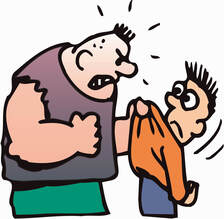 Robin Hood (if he existed) robbed from the rich, because that’s what criminals do, but he didn’t give to the poor – he bribed them. The poor peasants of Sherwood Forest would keep his whereabouts a secret so long as he was paying them more than the measly reward being offered by the Sheriff of Nottingham. And if the Sheriff of Nottingham increased the reward money, there was always the threat of violence to ensure the peasants’ continued silence. At the time these thoughts started to form I didn’t have much time to do anything with them. I had a full and busy life (I still have) and the idea of writing a book just didn’t seem feasible at the time. It was many years later when I started to write the odd paragraph that laid out my thoughts on the subject. The thoughts turned into characters and once I had those I could create the conflicts that would turn into a plot. So, what of the other characters? I won’t bother with the other outlaws. Criminals often work in gangs so we can assume that if Robin Hood is a bad guy, then his pals will be bad guys too. I gave some of them back stories, but ones that would lead them into a life of crime.  King John King John We have Prince John (as he was at that time). Well, he was the fourth son of a King and in those days the sons of kings pretty much took what they wanted. Historically, John didn’t have any land to draw an income from. His father had granted him rule over Ireland, but first he had to conquer it and that didn’t work out too well. When his big brother Richard became King he gave John the rights to the taxes from Leicestershire, Derbyshire and Nottinghamshire so that he would have some form of income. John gave orders to squeeze aa much in taxes from those counties as was possible, but that was the Sheriff’s job regardless of whether the taxes went to Richard or to John. John wasn’t a great Prince or King, but history tends to paint him as being worse than he really was for the period. Trust me when I say we have had worse kings (and queens) than John. The Sheriff of Nottingham was just doing his job, really. His job was to keep the peace and to collect the taxes on behalf of the King (or in this case, Prince John). Nobody likes tax collectors and if you were a criminal in Nottinghamshire you had other reasons not to like the Sheriff very much. In modern terms many people don’t like or trust the police, but they are the first ones to call 999 when their houses are burgled. So, I decided that the Sheriff of Nottingham was probably nothing out of the ordinary for the period, but he did have a boss that wanted more money, so he was probably a bit zealous when it came to collecting the taxes.  Maid Marion, a really foxy lady. Maid Marion, a really foxy lady. Maid Marion was probably the hardest character for me to create. At first I made her a “bad girl” who was attracted to Robin because of his nasty character (according to my version of him). It is a familiar trope and one that exists in real life (Bonnie and Clyde, Rose and Fred West, Myra Hindley and Liam Brady et al). But I realised I needed a nice character to contrast all the bad ones, so that became part of her role in the story. She’s a bit of a “goody two shoes” but that just helps to contrast with Robin’s darkness. Robin himself was easy to create. 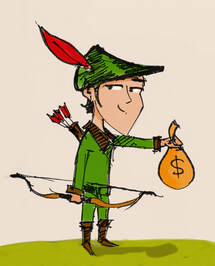 I followed some of the mythology and had him serving with King Richard’s crusaders, but rather than being a heroic figure coming home to reclaim his land and titles, I decided that he had used his time the Middle East to line his own pockets (the real purpose of the crusades was to grab land and wealth anyway. The re-conquering of Jerusalem for Christianity just provided an excuse.) and that had led to him crossing the wrong person. He fled King Richard’s army and returned to England. As he had been declared an outlaw for what he had done he had to live by his wits which, in those days, meant robbing and stealing. But even if Robin hadn’t been declared an outlaw, he would probably have followed a criminal path, because he wasn’t the type to earn an honest living. At least, my version of him wasn’t. That left me needing a hero, so I used a popular trope, which is the wrongly accused man. My hero, Erlich, is falsely accused of killing his own father and has to go on the run or face a noose. He finds a relatively safe haven with Robin Hood and his gang but hates the life they lead. All he really wants to do is clear his name and go back to his old life.. 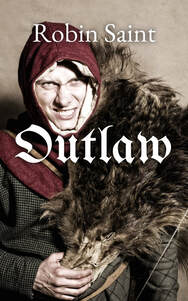 So, with a cast of characters all I needed was a plot to carry them and there were plenty of tropes to call on for that. Readers may recognise some of them. That is how I created Robin Hood the bad guy and turned him into my novel “Outlaw”. If you have any questions, feel free to post them in the comments section below and I’ll be happy to answer them. To find out more about “Outlaw” by Robin Saint, click this link. * Editor's note: Little known fact: The Kray Twins were the last prisoners to be held in the Tower of London. Ask in the comments section if you want to know why. If you have enjoyed this blog, or found it informative, then make sure you don’t miss future editions. Just click on the button below to sign up for our newsletter. We’ll even send you a free ebook for doing so.
This week we hand our blog over to our most prolific author, Robert Cubitt. Disclaimer: The views expressed in this blog are those of the blog's author and are not necessarily those of Selfishgenie Publishing.  Author Robert Cubitt Author Robert Cubitt Authors get asked a lot of questions. Some of them sensible and others not so. Having been given the freedom of this blog I’d like to answer some of the sensible ones from my own perspective. One of the most common questions an author gets is “How did you get into writing?”. Well, it goes back all the way to my childhood. I loved reading. My local library, when I was about 13, would only allow me to take out one book at a time, but on at least one occasion I visited 3 times in one day because I read my single book so quickly. It was a 4 mile roundtrip and I had to walk, which says a lot about my reading addiction. It was only later that I worked out that it would have been a lot more efficient for me to sit in the library to read my book, which says a lot about my ability to think logically at the age of 13.  At the same time, I loved essay writing at school. “What I did on my holidays” (and other such topics) gave me the opportunity to create all sorts of adventures. I was once punished for writing a less than true account of whatever the teacher had asked us to write about that day and my mother went to the school and protested on the grounds that they were stifling my creativity. The objective, she pointed out, was to produce a piece of well written work, not to provide evidence for use at a trial. My mother’s intervention made no difference. For future assignments I was warned not to stray from the truth. What I actually did was tone down the drama in my fiction to make it more believable. Perhaps my first lesson in plot creation! I made my first attempt to write an actual book when I was about 14. I had no idea what I was doing, of course. My characters were shallow, and the plot made no sense. But everything we do provides us with lessons and the lesson I learnt from that was that writing a novel wasn’t as easy as I had imagined. But it didn’t put me off writing. 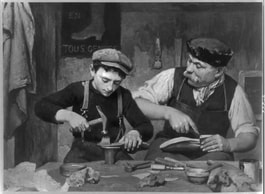 An apprenticeship in some arcane craft. An apprenticeship in some arcane craft. The school I went to when I was between the ages of 14 and 16 wasn’t the sort of school that produced writers. Pupils were expected to “learn a trade”. It was an all-boys school which meant apprenticeships in some arcane craft, motor mechanics, the building trade and so on. I assume that at the girls’ school across the road they were being taught to type, to cook and to raise babies. Our horizons weren’t even stretched as far as working in an office, at least, not without staying on for 6th form, which the families of most of the boys couldn’t afford for them to do. Regardless of academic ability. the vast majority left school at 16 to start earning a living so they could contribute financially at home.  So that’s what I did. However, having been raised on the works of Captain W. E. Johns, author of the “Biggles” books, I decided to learn my trade in the RAF. But I didn’t stop writing. Almost every RAF station I served on had a station magazine and they were always looking for “content”, as we would call it today. I was happy to oblige them, though not everything I wrote was published. Apparently, parodying the domestic lives of the senior officers is frowned upon. Who knew? At the end of my 23 year stint, I suddenly found myself unemployed. I threw my efforts into finding a job, of course, but we were in a recession at the time and job hunting was an uphill struggle. To preserve my sanity in that dark time I decided to have another go at writing a book.  Learn from the best. Learn from the best. Having, to a certain extent, honed my skills in writing for magazines, what I produced was far better. I won’t go as far as to say it was good, as evidenced by the fact that I have never attempted to get the book published. But it was a start. It also served its purpose in keeping my mind occupied. More than that, it was a learning exercise. The most important lesson I learnt was that it is the characters who must take centre stage. A plot without good actors will never work. Instead of reading for pleasure, I started to read to learn how to write. Firstly, I read the books of successful novelists and analysed them to discover why they were so good. It always came down to the characters. The plots could be laughable in the way they were contrived, but having good characters, ones I came to care about, meant that the clunky plot was ignored, and I enjoyed what I was reading because of my emotional engagement with the characters. It was probably the most valuable lesson in writing I have ever learnt.  I eventually got another job and 17 years later switched jobs again. That final job was actually 20 hours of work squeezed into a 35 hour week, so I had a lot of time on my hands. I used the extra time to start writing again. I spent so much time writing that on one of my performance reviews my boss commented on how busy I always was, constantly beavering away. Little did he know! (BTW, I always did my real job first and to the best of my ability and was commended for my achievements). But the writing spark had turned into a forest fire, and I wasn’t dishonest enough to keep allowing my employers to continue paying me to be writer, so I took early retirement and started writing full time. Here I am, 12 years later and with 31 books published (including non-fiction) and I’m still writing like there’s no tomorrow. 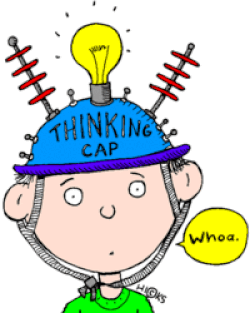 The next question I would like to answer is “where do you get your ideas from?” Well, they are all around us, all the time. Let’s start with world news. Every bulletin has the potential to produce ideas that can be turned into a book. All human life is there, in graphic detail. The politics, the hardship, the heartache, the trauma, the drama and blessedly, sometimes, the humour. Turn on the TV or radio news, pick up a printed newspaper or go onto the internet and there are myriad news stories just waiting to be fictionalised. Real authors can spot those and turn them into a full length novel.  History is a great source of ideas for stories. So many kings, queens, politicians, rogues, heroes, vagabonds, explorers, adventurers etc. Each has their own story and those can be borrowed and turned into fiction. I’m a great fan of this genre myself. Then there is everyday life. Some people call it “people watching”, but the world around us can provide the author with a thousand stories if they have the imagination. A young woman running for a bus, almost losing a shoe, can provide a hundred questions as to how she came to be there and what may become of her. If the author can imagine good answers, they can turn them into a book. Finally, there are our own “lived” experiences. Life rarely runs smoothly for anyone, and the speed bumps and car crashes all provide us with stories we can tell. In reality we do tell them, to friends and family, or maybe to our therapists. All an author does is write the same stories down and pad them out to a length that will make them a book rather than an anecdote. Of course, they have to be amplified to make them more dramatic/romantic/funny but that comes down, once again, to imagination.  What about sci-fi and fantasy? They don’t come from day to day life. Wrong. For the most part, sci-fi and fantasy novels are made up of the same plots as the stories we set on Earth. They just have bits added on to make them appear different. Star Wars, for example, is just the story of good vs evil transported to a galaxy far, far away. All the author does is to use their imagination to create worlds where the stories can be told, as they do with fantasy. “Luke, I am your father” is a trope that can be found in many an Earthbound story, as can the twins separated at birth. Shakespeare’s “Comedy Of Errors” and “Twelfth Night” both use the basic separated twins trope. The final question I want to answer is “Is it difficult to become a writer?”  If writing is ever this boring, you aren't a writer. If writing is ever this boring, you aren't a writer. My answer would be “no”. But there are many caveats to that. Anything you enjoy doing is never a chore. I enjoy writing, so I don’t find it difficult. If someone sits down and starts to write and they have become bored after a couple of thousand words, they will never become a writer. Not because they can’t write well, but because they clearly don’t enjoy writing. The more you study and practice a subject, the easier it gets. That is what I have done as a writer. But I find chess hard. Chess Grandmasters will tell you that playing chess is easy and for them it is. Because they have practiced for thousands of hours playing hundreds of thousands of games to get to where they are. Of course it’s easy for them. I play one game every ten years, so for me it’s always going to be hard. So it is with writing. The more you learn and the more you practice what you have learnt, the easier it gets. If your idea of writing is doing the weekly shopping list, you will struggle if you start to write a book. 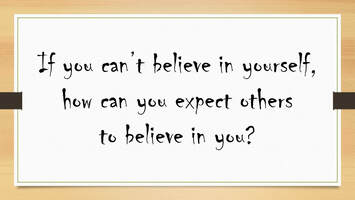 Finally, you have to believe you can write. Like many other creative professions, authors are plagued by insecurities. Imposter Syndrome stalks us like a hungry tiger. It sucks all the enjoyment out of writing which, as previously mentioned, is an essential part of being a writer. Overcoming that barrier of lack of self-belief has curtailed many a potentially successful writing career. So, when the whispers of self-doubt start to be heard in your brain, you have to shout back very loudly “I am a writer!” I shout it out loud, which is very disturbing for my wife. But if I didn’t, I would have given up 31 books ago. So don’t give up. Most authors take years to become an overnight success. Some never will become a success, but that doesn’t spoil their enjoyment of writing. To find out more about my books, see the "Books" page of this website. If you have enjoyed this blog, or found it informative, then make sure you don’t miss future editions. Just click on the button below to sign up for our newsletter. We’ll even send you a free ebook for doing so. 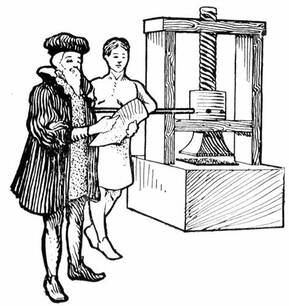 Is the game up for traditional publishers? I’m not talking about today or tomorrow. What I’m talking about may take years to come to fruition, but the publishing world is changing, and the trad publishers don’t seem to have cottoned on to the fact yet. Between themselves and agents, they have made it almost impossible to access mainstream publishing. The gate keepers are no longer just keeping the gate, they are building high walls and digging moats so deep in front of the gate that no one can get in. 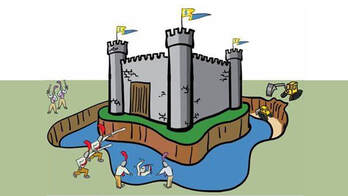 Which is why not only is the publishing model changing shape, it has no choice but to change shape. But the trad publishers are sticking their fingers in their ears and singing “la, la, la”. With so many authors now taking the self-publishing route, it is becoming the norm rather than the exception. According to this article, 300 million self-published books are sold each year. That’s 30-35% of the publishing market. While the global publishing market is expected to grow by 1% per year, the self-publishing market is expected to grow by 17% per year.  Prior to 1998, the only way to self-publish was to pay a printer to print your books, then hawk them around local book shops trying to find one to stock it for you. But in 1998 Chip Wilson, a millionaire entrepreneur, created a self-publishing website called Lulu and that all changed. Now anyone could publish their book on-line and sell it through the platform. Imitators followed and, of course, the retail giant Amazon established their own platform, Kindle Direct Publishing (KDP), which now dominates the self-publishing market. So, from almost nowhere in 1998, self-publishing now holds approximately 34% of the market – and growing. I’m not going to say that the quality of the books is 100% great, but there are plenty of good self-published authors and many make a respectable living from their writing. In fact, some make a better living than authors who are trad published. There are at least 7 self-published authors achieving 7 digit income levels and many more making 6 digit levels. 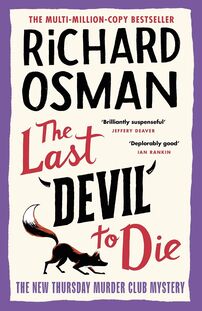 Which is one of the reasons I think there will be further shifts in the industry. A trad published author receives about 10% of the sale price of their book in royalties. From that they then have to pay their agent (actually the agent usually gets the royalty cheque, deducts their commission and then passes the rest to the author). Richard Osman’s latest best-seller is priced at £11.99 for the Kindle edition and £9.99 for the paperback at the time of writing this blog. Don’t ask me why the paperback is cheaper because I don’t know, but it probably started out being more expensive. Based on current publishing practice Richard will receive around £1.19 in royalties for the Kindle edition and around 99p for each paperback sale. If he were to self-publish and sell his book at the same price, he would make either £3.60 or £8.39 per copy, depending on whether he took the 30% or 70% royalty option. If I were Richard, I’d be starting to wonder about the wisdom of sticking with trad publishing.  As a big name author, he would have no problem setting up distribution deals with all the major retailers, without having to rely on his publisher to do that for him. The rest is down to editing, cover design and marketing and he could hire people to do that for him. I think he’d still end up with more money in his pocket than he does now. For a start, he wouldn’t have to give between 10% and 20% of his royalties to an agent. I suspect that a lot of trad published authors will do these sort of sums in future and when their existing publishing deals come to an end, they’ll self-publish the next book they write.  It is noticeable that publishers are now trying to tie authors into multi-book contracts in order to prevent that sort of desertion, though at the moment they are more worried about their authors being poached by other trad publishers than they are about their authors opting to self-publish. The more top quality authors who go down the self-publishing route, the better the reputation self-publishing will gain. I strongly suspect that the much of prejudice against self-published authors is being fuelled by trad publishers trying to protect their businesses.  Change sometimes happen at a glacial speed. But change can also function more like a snowball rolling down a hill, getting bigger and bigger and going faster and faster. I may not be around for long enough to see which metaphor is more accurate, but many of you will be. But I predict that one day, when a new author announces on social media that they are about to start querying their novel, the response from other writers won’t be “Good luck”, it will be “Why on Earth are you bothering with that?" If you have enjoyed this blog, or found it informative, then make sure you don’t miss future editions. Just click on the button below to sign up for our newsletter. We’ll even send you a free ebook for doing so. Selfishgenie Publishing are pleased to hand over our blog this week to one of our poets, AngieD, who is writing about how she became a poet and how she is inspired to write her poetry. Disclaimer: All views expressed in this blog are those of the author and aren't necessarily those of Selfishgenie Publishing  Poet AngieD Poet AngieD I’d like to say that writing poetry was something I was good at in school, though in between Romeo and Juliet, Hard Times et al, there didn’t appear to be much time devoted to this category of English Literature; what little poetry we children were exposed to I could barely understand since, to my mind, it was in adult language and highly cryptic; too cryptic for my little ears. I therefore had very little knowledge of what poetry was about, except for limericks and nursery rhymes. And so, if I said it was something I’ve always wanted to do and that each time I read a ditty it had me thinking “Gosh! I wish I could write a verse” and piqued any great interest, I would be lying! It wasn’t something that ignited any spark of excitement or great interest at all, quite different from hearing someone with extraordinary musical abilities, which aroused feelings more of jealousy that I couldn’t, and probably would never, play like that.  I didn't get excited about poetry. I didn't get excited about poetry. So, besides reading limericks and silly nursery rhymes, I didn’t really give poetry much thought. In fact, the first I really knew about any ability to write a verse was quite a few years ago, lying in bed one weekend morning in my very small and humble-in-great-need-of-decoration second floor London flat and being disturbed by the neighbours occupying the one below. They were making an awful racket but, instead of getting highly irritated (well, not strictly true – I was a little irritated at first!) my mind just seemed to speak in rhyme. It was quite a startling and frightening revelation to me.  Gracula religiosa intermedia (Common Hill Myna) Gracula religiosa intermedia (Common Hill Myna) At first I heard myself say “who’s that talking?” not realising it was my mind. Nevertheless, I went with the flow, chuckling as I wrote down the words of this verse about a Myna bird. I had never had an encounter with one; I’d never even seen one. I even had to look it up. What connection had this with the noise I was hearing? I have no clue, but my first ever verse was written and, being a PA Secretary (and previously in the “be prepared” Girl Guides and Girls’ Brigade), I always had pen and paper by my bedside. And that was the start!  From then on it was, as they say, all systems go, like a dam had burst and that part of my mind which had laid dormant had suddenly woken up, its contents released, and there was now no turning back. Things I’d never noticed before would quickly come into my mind’s eye and words or lines would pop up. Voices would say “hurry up there’s another waiting to be written down”. It could be frantic at times since I couldn’t write quickly enough to get everything down! Now, was this the reason I learned shorthand?* Even if it wasn’t, it was now coming to the fore, since it enabled me to write at breakneck speed. This doesn’t bode well for wrists and hands since even before I arrived to start a day’s work, I was already weary from an hour or more of writing while on my train journey.  The lightbulb of inspiration. The lightbulb of inspiration. I found nothing in particular inspired me. In fact, everything inspired me. Finding a window seat on the train was my most important early morning mission so I could write while observing the scenery and how it changed from morning to morning. It was beautiful. How had I never noticed this before? So much to see and appreciate; now that was exciting! Scenery, people and animals were looked at in a different light. Do you ever notice the habits of people: feet on seats where others have to sit. Leaving their rubbish on seats and floor. Grownups picking their noses, biting their nails, coughing or sneezing without covering their mouths, speaking so loudly one can hear every word (and me itching to join in!). That annoying clicking on laptops or ‘phones as they type away as if the train is their office! My mind would just rhyme away; I could have sat on the train all day just writing.  Inspiration can come from anywhere. Inspiration can come from anywhere. I’m finding writing poetry is a 24/7 thing. Everything I look at, see, or hear becomes a subject. Although I have written now for quite a few years, I have only recently succumbed and accepted the fact that writing is a part of me. It happens anywhere at any time, in any place (church, supermarkets, the aforementioned trains), I’m not really conscious of it happening, it just happens; commuting on my way to work when I had to commute; walking from the railway station to the office; in a restaurant (and often I would be asked if I was a reporter!). Whatever popped up in my mind would have to be written down. I find writing takes no prisoners if it’s in your mind it has to exit somewhere and if one doesn’t comply pretty sharpish, it fades away and is forgotten. Work produced ample opportunities to write fun little personal verses. If a colleague was having a bad day, I could write something to make them smile. Business acquaintances too would engage and respond to my verse, in verse. Which made work all the more fun and, sometimes, they would even apologise for not replying in the same vein!  Everything seemed now to be about writing verses, not just writing a memo in prose, but some notification of meetings or cancellations were rhyme written and, again, replies would come back in verse! See, everyone can rhyme! Earlier years would see me go to bed with a pencil and notebook and practically never sleep! I am learning to control it a little more than in past years. I won’t say I’m completely successful, that would be impossible. If that which is filling my mind is not written down then it is lost forever. This has been tested; I’ve had a verse(s) in my mind and thought that chanting it over and over during the night would ensure it would be remembered in the morning. Not so, I couldn’t even remember the subject, so that much I’ve learned. Even though I now leave the pencil and paper on a cabinet three steps away from the bed, verses still often, come in the middle of night and I have to write them down but, thankfully, it’s much easier doing it via the recording app on my phone!  The queue of ideas is never ending The queue of ideas is never ending At times it feels like a tap that never switches off. Each new day brings a different set of subjects and so the writing continues, and you tend to become at one with whatever you’re writing about. It never occurred to me that I would be writing for so many years. Did I ever think I’d write so many? No. I thought one day I’d run out of things to write about, maybe about the 50th verse and that one day the verses will dry up. Touch wood, thousands of verses later it hasn’t happened yet. I am aware of the saying all good things come to an end, but my end has not yet come! Do I get tired of writing? Well actually, physically, yes I do. It’s a never-ending task to which most poets and authors of books can probably attest. There is always an idea in your head and before you can write it down another one is waiting in the wings eager to be noted. The unavoidable task of writing is logging all that is written!  The one about the loo rolls! The one about the loo rolls! I write to empty my mind of words to make room for the words I can see pushing past those I’m writing, so I think so there’s no time to enjoy. I do often sit while watching TV reading some of the verses and often wonder what the blazes was I thinking to write that (like the one about loo rolls!). But what I enjoy most and the best reason to write is seeing those who hear my readings, and knowing those who read my book smile and/or comment that they can relate to whatever they’ve heard, whether it’s romance or why toenails grow much faster than fingernails. I’ve said it before and I’ll say it again, if it makes people smile or gives food for thought then it’s been worth writing! 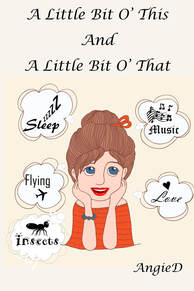 Poetry seems to be within me for the foreseeable future, so I have (happily) learned to live with it and the constant buying and sharpening of pencils!. Poetry is my world along with music, spinach, dancing and cheese. To find out more about AngieD’s poetry, see her collections on our “Books” page. Two more volumes are scheduled for publication during Spring 2024. * For younger readers, shorthand was a system of speed writing. The modern versions can be traced to 1720, but it is known to have existed as far back as the 4th century BC. It is a way of writing that allowed secretaries, journalists etc to record the spoken word at the same pace as it was uttered, without missing any of it. Modern technology has rendered it obsolete. To find out more about AngieD’s poetry collections, click here. If you have enjoyed this blog, or found it informative, then make sure you don’t miss future editions. Just click on the button below to sign up for our newsletter. We’ll even send you a free ebook for doing so.
 It is a sad fact that around 80% of people who start to write a book, never finish writing it. Why such a high dropout rate? It’s not easy to say as those that don’t finish don’t tend to talk about why they didn’t finish, but we can make a few assumptions which may not be too far off the mark. First there is the time factor. Writing a book is a very time consuming activity and when someone has competing priorities, such as work or family, something has to give and the thing that is easiest to abandon is writing. 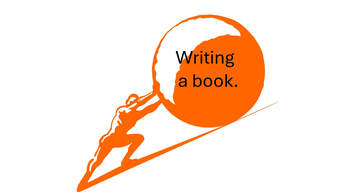 Secondly, some people don’t actually realise that writing a book is quite difficult. They assume that the words will simply flow from their brains to their keyboard of their own volition and in no time at all there will be a 90k manuscript that is all ready to go to the publishers. That is down to a lack of research, of course. Anyone who spends even the smallest amount of time on social media groups dedicated to writing would soon see the posts from frustrated writers and would realise that writing isn’t anything like as easy as it seems. Then comes the realisation that writing the book is only a fraction of the work that is involved in producing a book. Once it is written it has to be edited, market tested (beta readers), edited again, proofread and then the biggest mountain is still ahead: either finding an agent or going self-published. That is enough to put the less motivated off the idea of finishing their book. 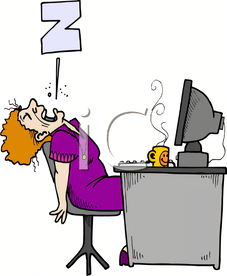 Which brings us to the biggest barrier of all for finishing the writing of a book: a lack of basic motivation. It is very easy to come up with an idea for a book. We can be inspired in all sorts of ways, including the “I’m pretty sure I could write a better book than this myself” we have all probably felt after reading a mediocre book. But the world is full of half-finished projects for which the explanation is that the person who started the project didn’t have enough motivation to finish it. Real writers are highly motivated. There can be no doubt about that. There are many reasons they are motivated, and we can take a look at some of them.  The most obvious is that they have a story to tell and writing it down is the best way of telling it, other than pinning someone in a corner and telling it to their face while they try to escape. I’m one of those sorts of writers. Once I have an idea for a story there is no way I can rest until it is written. Sometimes I’m halfway through writing one story when a second comes along and demands attention. It can be a real problem finishing the first story while the second one jumps around in my head trying to get my attention. I think that many real authors suffer from that problem, which is why they produce so many books at frequent intervals. They just can’t stop the stories from flooding out.  The second motivation is that people do it for money. If you are just starting out on your journey as an author, and the possibility of making a lot of money is what is motivating you, then brace yourself, because I have some bad news for you. 70% of all the books ever written never sell more than 100 copies. How motivated do you feel now? There are many reasons why they never sell more copies, and a lack of marketing is one of them, but it shows you what a tough industry you have chosen to enter. Of the remaining 30%, 70% of those will never sell more than 1,000 copies. To put that into context, you have to sell around 30,000 copies to make the equivalent of the “living wage” in the UK, which is about £20k p.a. at time of writing (about $25k or €23k).  Only the smallest percentage of authors will ever make more than the living wage from writing books and the mega rich authors are the ones that get their books turned into movies or TV series. Yes – that could be you. But before you give up your day job, ask yourself what the probability is. The vast majority of authors are the equivalent to the Sunday-morning-in-the-park footballers comparing themselves to Lionel Messi (or Joe Burrow if you are American). 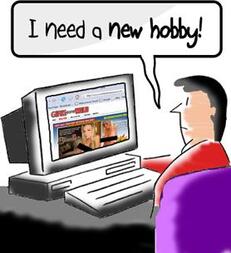 For many authors writing starts out as a hobby; something they like to do to pass the time. The thought of actually publishing a book often doesn’t cross their mind. It is something suggested by someone who has read their “scribblings” as they self-effacingly describe them. Those people tend to be some of the ones in the 70% who never sell more than 100 copies, because they don’t understand that the writing is the easy part. It is the marketing that sells books and that is the difficult part. Thos sorts of people would much rather just keep on with the writing part, so their books never sell. Which is a great pity because they might be potential best-sellers, but no one will ever know.  For some people writing is cathartic. Writing allows people to express their emotions, especially negative ones. Getting things down on the page is a form of release. It can also provide insights into why people feel the way they do, so it is good for their mental health. I have met many authors who have told me that this is why they write. Many of those sorts of books become best sellers, because the emotions expressed are so authentic. 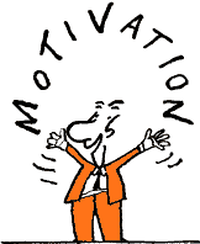 I have described just 4 examples of motivation for writing in this blog, one of which is actually built on a false premise. There are many more I am sure. Why not tell us what motivates you to write? Use the comments section below to share your story. So, if you are just starting out on your writing journey, ask yourself how you are going to keep yourself motivated for weeks, maybe months, on end while you work on your book. Then ask yourself how you are going to keep yourself motivated during the seemingly endless querying process. And, if the querying process doesn’t pay off and you end up self-publishing, ask yourself how you are going to keep yourself motivated while you market your book yourself.  I’d love to be able to answer those questions for you, but in the writing world there is no boss or team to help you stay motivated. There is only you, the device you are writing on and, if you are lucky, a loved one who will keep you supplied with cups of tea and comforting words. But you aren’t really alone. There are thousands, possibly hundreds of thousands, of people in the world just like you. Join a writers’ group either in the real world or the virtual world, because they, too, can provide you with encouraging words. But it will still be down to you to do the rest and there is no one to motivate you to do it except you. If you happen to have some good motivational tips, please feel free to share them in the comments below. If you have enjoyed this blog, or found it informative, then make sure you don’t miss future editions. Just click on the button below to sign up for our newsletter. We’ll even send you a free ebook for doing so. 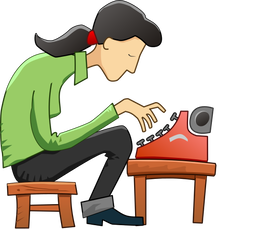 Having a great idea for a story is one thing, turning that idea into a book that people want to read all the way to the end is something else. Countless books end up as DNF (did not finish) and attract poor reviews because the author couldn’t keep their readers interested enough in what was happening for them to stay the course and finish the book. And a book that ends up as DNF means that its reader won’t buy the author’s next book. Then you have the books that readers did finish but didn't like, which also attract poor reviews. So, 10 simple tips to make sure your book doesn’t share that DNF fate and attracts good reviews. They aren’t complicated, but they do need to be at the forefront of the author’s mind as they write. 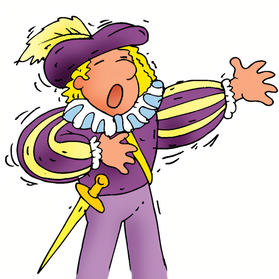 1. Invest time in your character building People engage with characters, not plots, so the characters are the most important part of writing. A good protagonist (or MC if you prefer) isn’t what is visible from the outside. It is what is on the inside that counts. We may be attracted to a person by their looks and style, but we fall in love with them because of who they really are, even making allowances for their flaws. In real life we don't fall in love with shallow people, so why would we do it in books? Create a pen picture for all your major characters. Start by giving you character a back story, beginning with their family and home life, through their education, their peer groups and their life experiences. These things shape their values and beliefs and those are the things that direct their behaviour. Your character has to behave consistently, in accordance with their values and beliefs. They may be forced by circumstances to “act out of character” at times, but that always creates a dilemma for them and is a source of internal conflict (see below). Above all give them emotions, so that readers feel those emotions and reflect them in their reading experience. If your character is moved to tears, your readers should be moved to tears too. If your character is laughing, your reader should also be laughing. You may not use a lot of the material that you generate in your pen pictures, but knowing how characters will behave in any particular set of circumstance means they can behave consistently over a lengthy story.  2. Create a meaningful conflict. Character + conflict = plot. The conflict that faces your protagonist is what the story is all about. No matter what the conflict is, they have to resolve it by the final page in order to complete the story and fulfil the destiny you create for them. Conflicts come in many different disguises and will depend very much on the genre in which you write. It can be the character’s internal struggle to overcome their own demons, or it can be an external struggle to overcome actual demons. Every story, even a comedy, is about overcoming conflict. But whatever the conflict is, it has to be of interest to the reader, so it has to be larger than life and something that readers are unlikely to experience for themselves, which makes it interesting for them  3. Create a meaningful consequence Failure to resolve the conflict has to have consequences, otherwise it is hard to inject drama into the story. The more severe the conflict, the greater must be the consequences of failure. In romance, failure may end with a broken heart. In a court room drama failure may end in imprisonment or financial ruin. In action adventure the consequence of failure is almost always death and/or destruction. Whatever the consequence, it has to match up with the reader’s own fears because that is what will keep the reader turning the page. Even though the reader knows the story will probably have a good outcome for the protagonist, that element of doubt is what keeps them reading, because they have to know how the protagonist avoids the consequences.  4. Motivate your character. In a story, as in real life, the protagonist has a choice whether or not to get involved with the conflict. A hero isn’t a hero because they are brave. A hero is a hero because they choose to run towards trouble when other people are running away from it. This means that the protagonist has to have a reason to get involved and this is where their values and beliefs come in. On the other hand they can’t get involved because they are compelled to by some outside agency. In other words, it can’t be just about the job they do. There must be an opportunity to walk away early in the story and even later in the story when things get difficult. Take a typical private investigator story. The PI gets involved initially because they have been hired to do so, but they can also turn the case away if they wish. They don’t know at that stage that their life may be threatened. Later, however, they find that their life is on the line if they continue the investigation, so they can choose to walk away. Why they don’t walk away is because of their motivation, not because they are being paid. The motivation has to be believable, and it must fit in with the character you described in your pen picture.  5. Invest time in creating your villain Authors often spend a lot of time building good protagonists, only to let themselves down with their antagonist. Nobody is born bad, so there must be a reason for them becoming the person they are. It doesn’t matter the genre, your villain has to have his or her own back story which explains their behaviour. Just as with your protagonist, you may not use all the material you generate in developing your antagonist, but if you understand them it will add depth to your plot and your readers will understand them. 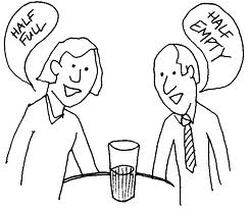 6. Create smaller conflicts to add complexity and drama. Sub plots are what turns a short story into a full length novel and those sub-plots are created with small conflicts that get in the way of your protagonist dealing with the big conflict. Imagine our PI, mentioned above, who owes money to a loan shark, who wants his money back. The PI spends time during the story dodging the loan shark, trying to raise the money to pay him back etc then, just as the PI is about to solve the case and confront the villain, they are snatched off the street by the loan shark and are threatened with dire consequences if the money isn’t forthcoming within the hour. There is several chapters worth of drama available in that short paragraph. Sub-plots are also a great way to put your minor characters centre stage for a while as they try to help the protagonist deal with the minor conflicts so the protagonist can get on with dealing with the major conflict. This is what injects "pace" into a story; the peaks and troughs in the action that keep the reader turning the page to find out what happens next. However, the sub-plots and the main plot must interact with each other. If the sub-plot has no impact on the outcome of the main conflict it is redundant, and the reader ends up saying “what was that all about?”, which is not a good thing.  7. Do your research This applies to any genre but is particularly important when it comes to specialist settings such as police, medical or legal dramas and historical fiction. Readers of that sort of fiction know their stuff and they expect their authors to know their stuff as well. I’ll give you a real life example. I recently read a book set during World War II. The first third of the book was set against the backdrop of an RAF Lancaster bomber squadron. It became quite clear that the author knew nothing about the RAF. He had researched the Lancaster bomber and knew quite a bit about that (but not as much as he should have known), but he was clueless about the RAF in general. As I’m a former member of the RAF he had me wanting to throw my Kindle at the wall in frustration at the gaffs he committed, and he completely undermined his credibility as an author writing about that period. Needless to say, the book ended up as DNF. What made it worse was that most of what he needed to know he could have found on the internet and the rest from one of the several standard works about the RAF during WW2. The golden rule is always “write what you know”. As that is a bit limiting the next best thing is to work out what you don’t know and learn about it. Learn everything about it. Like character development, you may not use everything you learn, but at least you won’t make the sorts of gaffs the above author made, your credibility will be retained and your story will be more authentic. It’s easy to say “Readers probably won’t know that, so I won’t bother researching it” – but some readers will know it and they are the ones who will write the bad reviews of your book. 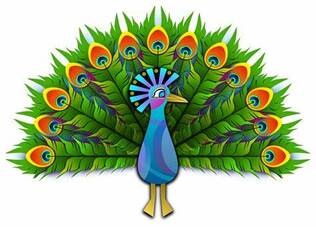 8. Don’t show off. This includes using multi-syllable words when single syllable words will do and using technical, scientific or jargon words that readers won’t understand, or including unnecessary detail just to prove you’ve done your research. Your readers don’t want to have to read your book while holding a dictionary in one hand and an encyclopaedia in the other. So, use language that the average reader will understand, even if you know all the technical or scientific terms yourself. There will be times when you need to use those terms, in context, but make sure that you provide your readers with an explanation so that they will understand it too. You can have the protagonist or another character acting in place of the reader and have the “expert” explain what they mean in simple language, for that character’s (and the reader’s) benefit. This is often done in cop shows where the Forensic Medical Examiner has to explain post-mortem results in terms the lay person (the viewer) will understand.  9. Know the ending before you start. If you know how your story is going to end, you can construct a “road map” that will take your protagonist to their destination. One of the biggest problem for “pantsers”, as some authors are called, is that in not having a map to follow, they get side-tracked, which is confusing for the reader and it is hard for the author to get the plot back on track because they have confused themselves. It is OK to deviate from the map, but if you don’t have a map to start with you won’t know if you are deviating from it. 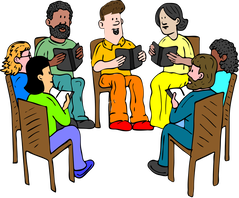 10. Write for your readers. Many authors are advised to “Write for yourself first” and that is OK if all you want to do is write. But if you want to write a best-seller, you have to write for your readers. You have to know what they want and what they expect, and you have to fulfil their wants and expectations. If you do that your book will get good reviews, which will mean it sells more copies. But if you don’t meet those wants and expectations, you can only expect bad reviews, which will stop sales in their tracks. What the readers want and expect will vary from genre to genre, so you have to understand your genre inside out, and that means reading books in that genre. Read the best-selling authors in that genre to learn from the best. Once you have established yourself as a best-selling author, you can then “write for yourself” in the certain knowledge that your name will sell the book. But you have to cross that bridge when you reach it, not when you are just starting your journey.  And Finally Nobody can guarantee that your book will be a best-seller. But if you follow the advice above, you will stand a better chance than those authors that don’t follow the advice. But if there is a key to success it is in the first three tips. Character, conflict and consequences. They are what make up the vital elements of the story. At least get those right and you are well on your way to writing a best-selling novel. Now that you have read this blog, why not take a look at our books to see if our authors have followed the advice that we have offered? Just click on the “Books” tab to see their work. If you have enjoyed this blog, or found it informative, then make sure you don’t miss future editions. Just click on the button below to sign up for our newsletter. We’ll even send you a free ebook for doing so. |
AuthorThis blog is compiled and curated by the Selfishgenie publishing team. Archives
March 2025
|
 RSS Feed
RSS Feed